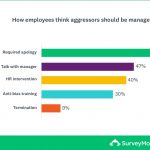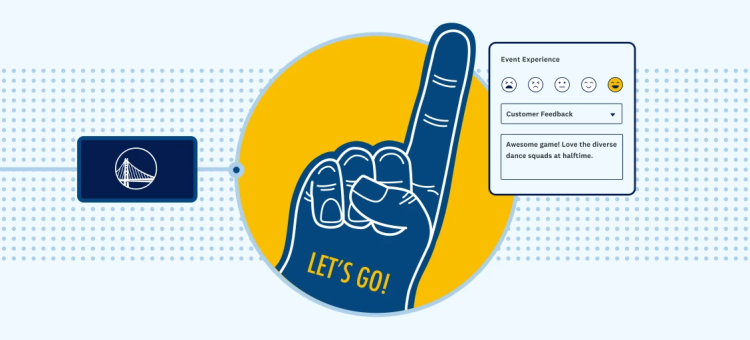“A senior partner asked to ‘touch my hair’ in order to confirm it was ‘all mine.’”
“An older male colleague interrupted me in a meeting and said, ‘now young lady…’ and then told me how I was incorrect in his opinion.”
“My hearing disability was described in a written evaluation by the board of trustees as ‘making communication difficult for my co-workers.’”
These real examples of microaggressions like these are incredibly common, according to our new research on the subject. Depending who you are, some of them may sound familiar.
Microaggressions—subtle, indirect, and sometimes unintentional acts of prejudice—are a problem that many people (especially in marginalized groups) experience personally, and many others fail to recognize. Because they can be nuanced, we wanted to learn more about the scope of microaggressions and which behaviors people find most offensive.
In partnership with Fortune, We asked 4,275 people about their experience with microaggressions, including overall number of people affected, and how people from underrepresented groups (women, people of color, those with disabilities, etc.) encountered them differently. Sixty-eight percent of Americans say it is a serious problem—and that’s just the start.
Do your employees feel comfortable?
The only way to ensure a truly inclusive work environment is to measure company culture and make positive changes. Our comprehensive guide explains how to do it, step-by-step.
The very real cost of microaggressions in the workplace
Microaggressions are more widespread than you may think. More than a quarter of Americans (26%) have definitely experienced a microaggression at work, and another 22% are unsure. Thirty-six percent have witnessed one (with another 24% unsure).

With only 40% of workers confident that they’ve never seen a microaggression, there’s a huge population that’s potentially affected—which could also mean bad business.
Seven in ten workers would be upset by one of these disrespectful interactions, and among those who were, half said the action would make them consider leaving their job. Experts estimate that losing a skilled employee costs a company roughly 33% of their annual salary—a high price to pay for some thoughtless words.
What are the most common microaggressions?
Some microaggressions were considered especially upsetting, and close to a quarter of upset workers would leave their job as a result of these issues:
- Unprofessional behavior
- Hearing demeaning comments about peers
- Having one’s idea taken by someone else

Other issues weren’t considered as dire, but were far more common:
Being addressed unprofessionally: Forty-five percent of workers say being addressed unprofessionally would upset them, and nearly three in ten say it would make them consider leaving their job.
Being told “you’re well-spoken” is also common: This issue, while it might seem innocuous, is often an issue for people of color. This is best illustrated through this comment, which was written in:
“When people speak to me over the phone before meeting me, they think I'm white. When meeting me, there is an unintentional facial reaction because I'm black and they are a little shocked. It implies that being black and well spoken isn't the norm.”
29% of workers have experienced it, and the comment is disproportionately upsetting to black workers, with 9% saying it would upset them compared to only 2% of white workers.
Being spoken over: 28% have experienced being spoken over at work—something that women find particularly jarring. (47% say it would upset them compared to 37% of men).
How microaggressions hurt underrepresented groups
Gender, age, physical appearance, and race are the most common identities put down with microaggressions, although experiences run the gamut.
Microaggressions can be incredibly damaging in professional atmospheres. At work, minorities already feel a lesser sense of belonging than their majority peers, and are acutely aware of the conscious and unconscious biases affect their interactions at work.
Microaggressions strain those insecurities, and contribute to a culture where not everyone feels included.
Who is responsible for microaggressions?
Unsurprisingly, only 10% of the respondents believed that they’d personally committed a microaggression, but understanding and taking ownership is important—especially since managers were frequently mentioned as the aggressors in our survey—which is a serious problem, because three in ten workers believe the experience is worse if committed by senior employees.
Microaggressions aren’t always intentional. The best way to address them proactively is through education and awareness.
How employers can address microaggressions—according to their workers
In our recent guide, “How to measure Diversity and Inclusion for a stronger workplace,” Heidi Williams, the CTO of tEQuitable, shared some ways that companies can proactively address microaggressions. To supplement those solutions, we asked respondents about their expectations about punishments for aggressors.
Here’s what the data has to say:
- 67% think the aggressor should be made to apologize
- 47% think managers should talk to their employees about potential microaggressions
- 40% think HR should step in
- 30% think that aggressors should have to undergo anti-bias training (though this goes up to 40% among people who have experienced a microaggression)
- Only 9% think the perpetrator should be fired

And here is Heidi’s initial advice.
- Create psychological safety for addressing these issues without blame. The message should be: “it’s okay to make mistakes as long as you learn from them.” Encourage employees to speak up and build awareness in the moment.
- Introduce education and resources. Share articles and books, create discussion opportunities, role plays, and workshops. Make some trainings required and others optional.
- Lead by example. Recognize and celebrate people who are living your inclusion values. (Only 2 in 10 of our respondents had heard leadership address microaggressions.)
Microaggressions are important to recognize, discuss, and address. That starts with building awareness—getting familiar with the types of statements that sting. To that end, we’ll leave you with a few final examples.
“He would repeatedly refer to something a woman said as ‘girl speak.’”
My boss told me it felt like he was talking to his wife when I asked him for directions to a location.
“A colleague made a comment about 9/11 not realizing my military service during the tragedy and years that followed.”
Which of the following best describes you?
Gender Answer Total Male Female Unweighted N 4,274 1,971 2,303 Employed – working full time 74%81%67%Employed – working part time 26%19%33%Not employed – student 0%0%0%Not employed – retired 0%0%0%Not employed – looking for paid work 0%0%0%Not employed – not looking for paid work 0%0%0%No answer 0%0%0%Question wording: Which of the following best describes you?Survey dates: –How serious a problem do you think discrimination in the workplace is in this country?
Gender Answer Total Male Female Unweighted N 4,274 1,971 2,303 Very serious 33%29%39%Somewhat serious 35%33%37%Not so serious 22%25%18%Not at all serious 9%13%5%No answer 1%1%1%Question wording: How serious a problem do you think discrimination in the workplace is in this country?Survey dates: –Do you think discrimination in the workplace is:
Gender Answer Total Male Female Unweighted N 4,274 1,971 2,303 Getting better 51%54%47%About the same as always 38%36%40%Getting worse 10%10%11%No answer 1%1%1%Question wording: Do you think discrimination in the workplace is:Survey dates: –Which of the following would you be comfortable joking with a coworker about? (Select all that apply)
Gender Answer Total Male Female Unweighted N 4,274 1,971 2,303 None of the above 56%50%63%The appearance of a celebrity 28%34%21%My own race 25%31%19%The appearance of a politician 25%32%17%My own gender 24%29%18%Someone of my own sexual orientation 16%22%10%Another gender 13%16%9%Another race 11%16%5%Someone of a different sexual orientation 9%13%5%The appearance of another person in the office 8%12%4%No answer 2%2%2%Question wording: Which of the following would you be comfortable joking with a coworker about? (Select all that apply)Survey dates: –Which of the following interactions have you experienced in the workplace? A coworker...(Select all that apply).
Gender Answer Total Male Female Unweighted N 4,274 1,971 2,303 None of the above 34%35%32%Addressing me in an unprofessional way 30%30%29%Telling me I’m well-spoken 29%31%27%Talking over me in a meeting 28%28%29%Repeating my idea and presenting it as their own 24%24%24%Asking about my dating life 24%24%24%Making a positive comment about my body 23%21%26%Asking about my qualifications 22%25%19%Mistaking me for someone in a role lower than mine 18%18%18%Making demeaning remarks about people like me 16%18%15%Making a negative comment about my body 16%18%14%Delegating note-taking to me 10%9%12%Asking me to get coffee for them 7%7%8%No answer 2%2%2%Question wording: Which of the following interactions have you experienced in the workplace? A coworker...(Select all that apply).Survey dates: –Which of the following interactions would upset you, or did upset you if they happened to you? A coworker...(Select all that apply).
Gender Answer Total Male Female Unweighted N 4,274 1,971 2,303 Repeating my idea and presenting it as their own 49%45%52%Addressing me in an unprofessional way 45%39%50%Making demeaning remarks about people like me 44%40%49%Talking over me in a meeting 42%37%47%Making a negative comment about my body 39%30%48%None of the above 27%31%24%Asking me to get coffee for them 24%22%25%Asking about my qualifications 19%16%22%Asking about my dating life 19%14%24%Delegating note-taking to me 15%13%18%Mistaking me for someone in a role lower than mine 13%11%16%Making a positive comment about my body 11%5%18%Telling me I’m well-spoken 4%3%4%No answer 4%4%4%Question wording: Which of the following interactions would upset you, or did upset you if they happened to you? A coworker...(Select all that apply).Survey dates: –Which of these actions did or would make you consider leaving your job?
Gender Answer Total Male Female Unweighted N 3,090 1,329 1,761 None of the above 48%50%46%Addressing me in an unprofessional way 28%25%30%Making demeaning remarks about people like me 27%24%31%Repeating my idea and presenting it as their own 25%23%26%Making a negative comment about my body 15%11%19%Talking over me in a meeting 10%9%12%Asking me to get coffee for them 7%8%6%Asking about my qualifications 6%5%6%Asking about my dating life 5%4%6%Making a positive comment about my body 4%2%6%Delegating note-taking to me 4%3%5%Mistaking me for someone in a role lower than mine 2%3%2%Telling me I’m well-spoken 1%1%1%No answer 2%1%2%Question wording: Which of these actions did or would make you consider leaving your job?Survey dates: –Thinking about where you work now, has HR or senior leadership at your company ever acknowledged the existence of microaggressions (whether in general or specifically at your company)?
Gender Answer Total Male Female Unweighted N 4,274 1,971 2,303 Yes 20%19%21%No 40%42%39%Not sure 38%38%37%No answer 2%1%2%Question wording: Thinking about where you work now, has HR or senior leadership at your company ever acknowledged the existence of microaggressions (whether in general or specifically at your company)?Survey dates: –Have you personally witnessed a microaggression in the workplace?
Gender Answer Total Male Female Unweighted N 4,274 1,971 2,303 Yes 36%34%38%No 39%40%38%Not sure 24%25%22%No answer 2%2%2%Question wording: Have you personally witnessed a microaggression in the workplace?Survey dates: –What identities have you seen negatively affected by a microaggression? (Select all that apply)
Gender Answer Total Male Female Unweighted N 2,617 1,145 1,472 Race 41%37%46%Age 40%39%42%Physical appearance 38%37%40%Gender 38%35%42%Sexual orientation 31%30%32%Education 28%29%27%Religion 23%24%22%Socioeconomic status 20%19%21%Disability 18%17%20%Veteran status 6%8%5%Other (please specify) 12%13%11%No answer 14%16%12%Question wording: What identities have you seen negatively affected by a microaggression? (Select all that apply)Survey dates: –Do you think that you have committed a microaggression in the workplace?
Gender Answer Total Male Female Unweighted N 4,274 1,971 2,303 Yes 10%13%7%No 62%59%66%Not sure 26%27%24%No answer 2%1%2%Question wording: Do you think that you have committed a microaggression in the workplace?Survey dates: –Have you experienced a microaggression against yourself in the workplace?
Gender Answer Total Male Female Unweighted N 4,274 1,971 2,303 Yes 26%23%29%No 51%52%49%Not sure 22%23%20%No answer 2%2%3%Question wording: Have you experienced a microaggression against yourself in the workplace?Survey dates: –Which of your identities were put down with a microaggression? (Select all that apply)
Gender Answer Total Male Female Unweighted N 1,239 476 763 Gender 35%21%48%Age 33%30%35%Physical appearance 31%33%30%Race 30%37%23%Education 22%25%20%Socioeconomic status 15%18%12%Religion 15%21%10%Sexual orientation 13%18%8%Disability 8%10%7%Veteran status 5%8%2%Other (please specify) 13%12%14%No answer 8%8%7%Question wording: Which of your identities were put down with a microaggression? (Select all that apply)Survey dates: –Thinking of the same experience, what did you do in response? (Select all that apply)
Gender Answer Total Male Female Unweighted N 1,239 476 763 Called them out at the time 31%31%31%Nothing 31%32%29%Spoke to them after the fact 20%22%19%Consider leaving the company 16%17%16%Reported the incident to their manager 16%14%18%Reported the incident to HR 11%11%11%Leave the company 10%9%11%Other (please specify) 12%12%13%No answer 5%6%5%Question wording: Thinking of the same experience, what did you do in response? (Select all that apply)Survey dates: –Did the person apologize?
Gender Answer Total Male Female Unweighted N 1,239 476 763 Yes 21%23%19%No 73%71%75%No answer 6%6%6%Question wording: Did the person apologize?Survey dates: –Was their apology acceptable to you?
Gender Answer Total Male Female Unweighted N 238 102 136 Yes 83%86%79%No 17%14%21%No answer 0%0%0%Question wording: Was their apology acceptable to you?Survey dates: –What do you want to happen to someone in the workplace who commits a microaggression? (Select all that apply).
Gender Answer Total Male Female Unweighted N 4,274 1,971 2,303 Their manager should talk to them 47%43%53%HR should talk to them 40%36%44%They should attend mediation or anti-bias training 27%21%32%The person they offended should talk to them later 16%17%16%The person that they offended should call them out then and there 16%16%14%Someone else should call them out then and there 11%11%11%Nothing 11%14%6%Someone else should talk to them later 10%11%10%They should be fired 9%8%10%Other (please specify) 9%11%8%No answer 5%5%6%Question wording: What do you want to happen to someone in the workplace who commits a microaggression? (Select all that apply).Survey dates: –Do you think someone who commits a microaggression should be required to apologize?
Gender Answer Total Male Female Unweighted N 4,274 1,971 2,303 Yes 67%59%76%No 27%35%18%No answer 6%6%6%Question wording: Do you think someone who commits a microaggression should be required to apologize?Survey dates: –Do you think it makes a difference if a microaggression is committed by a peer or a senior person?
Gender Answer Total Male Female Unweighted N 4,274 1,971 2,303 Much worse if a peer 4%4%4%Somewhat worse if a peer 3%3%3%No difference 57%57%57%Somewhat worse if a senior person 14%15%12%Much worse if a senior person 16%15%18%No answer 6%6%6%Question wording: Do you think it makes a difference if a microaggression is committed by a peer or a senior person?Survey dates: –



